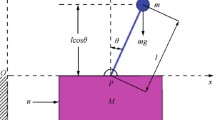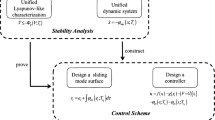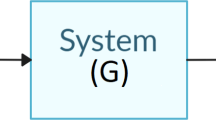Abstract
Although the classical PID (proportional-integral-derivative) controller is most widely and successfully used in engineering systems which are typically nonlinear with various uncertainties, almost all the existing investigations on PID controller focus on linear systems. The aim of this paper is to present a theory on PID controller for nonlinear uncertain systems, by giving a simple and analytic design method for the PID parameters together with a mathematic proof for the global stability and asymptotic regulation of the closed-loop control systems. To be specific, we will construct a 3-dimensional manifold within which the three PID parameters can be chosen arbitrarily to globally stabilize a wide class of second order nonlinear uncertain dynamical systems, as long as some knowledge on the upper bound of the derivatives of the nonlinear uncertain function is available. We will also try to make the feedback gains as small as possible by investigating the necessity of the manifold from which the PID parameters are chosen, and to establish some necessary and sufficient conditions for global stabilization of several special classes of nonlinear uncertain systems.
Similar content being viewed by others
References
Åström K J, Hägglund T. PID Controllers: Theory, Design and Tuning. 2nd ed. Research Triangle Park: Instrument Society of America, 1995
Åström K J, Tore Hägglund T. Advanced PID Control. ISA—The Instrumentation, Systems, and Automation Society, 2006
Blanchini F, Lepschy A, Miani S, et al. Characterization of PID and lead/lag compensators satisfying given H1 specifications. IEEE Trans Automat Control, 2004, 49: 736–740
Hara S, Iwasaki T, Shiokata D. Robust PID control using generalized KYP synthesis: direct open-loop shaping in multiple frequency ranges. IEEE control syst, 2006, 26: 80–91
Ho M T, Lin C Y. PID controller design for robust performance. IEEE Trans Automat Control, 2003, 48: 1404–1409
Keel LH, Bhattacharyya S P. Controller synthesis free of analytical models: Three term controllers. IEEE Trans Automat Control, 2008, 53: 1353–1369
Killingsworth N J, Krstic M. PID tuning using extremum seeking: online, model-free performance optimization. IEEE control systems, 2006, 26: 70–79
Silva G J, Datta A, Bhattacharyya S P. PID Controllers for Time-Delay Systems. Boston: Birkhäuser, 2005
Söylemez M T, Munro N, Baki H. Fast calculation of stabilizing PID controllers. Automatica, 2003, 39: 121–126
Ziegler J G, Nichols N B. Optimum settings for automatic controllers. J Dyn Syst Measur Control, 1993, 115: 220–222
Guo L. Some perspectives on the development of control theory (in Chinese). J Sys Sci Math Sci, 2011, 31: 1014–1018
Xie L L, Guo L. How much uncertainty can be dealt with by feedback? IEEE Trans Automat Control, 2000, 45: 2203–2217
Guo L. How much uncertainty can feedback mechanism deal with? Plenary Lecture at the 19th IFACWorld Conngress, Cape Town, 2014. www.ifac2014.org/assets/pdf/plenary/Guo.pdf
Zhao C, Guo L. On the capability of PID control for nonlinear uncertain systems. arXiv:1612.06498, 2016
Reissig R, Sansone G, Conti R. Non-linear Differential Equations of Higher Order. Springer: Netherlands, 1974
Ren J L, Cheng Z B, Guo L. Further results on limitations of sampled-data feedback. J Syst SCi Complex, 2014, 27: 817–835
Krstic M, Kanellakopoulos I, Kokotovic P V. Nonlinear and Adaptive Control Design. New York: John Wiley & Sons, Inc., 1995
Khalil H K. Nonlinear Systems. 3rd. Englewood Cliffs: Prentice Hall, 2002
Feßler R. A proof of the two-dimensional Markus-Yamabe stability conjecture and a generalization. Ann Polon Math, 1995, 62: 45–74
Markus L, Yamabe H. Global stability criteria for differential systems. Osaka Math J, 1960, 12: 305–317
Chen P N, He J X, Qin H S. A proof of the Jacobian conjecture on global asymptotic stability. Acta Math Sin, 2001, 17: 119–132
Acknowledgments
This work was supported by National Natural Science Foundation of China (Grant No. 11688101), and by National Center for Mathematics and Interdisciplinary Sciences, CAS. The second author would like to thank Prof. Yi HUANG for valuable discussions on control of nonlinear uncertain systems, and to thank Prof. Pengnian CHEN for his useful information on the Markus-Yamabe conjecture.
Author information
Authors and Affiliations
Corresponding authors
Rights and permissions
About this article
Cite this article
Zhao, C., Guo, L. PID controller design for second order nonlinear uncertain systems. Sci. China Inf. Sci. 60, 022201 (2017). https://doi.org/10.1007/s11432-016-0879-3
Received:
Accepted:
Published:
DOI: https://doi.org/10.1007/s11432-016-0879-3




